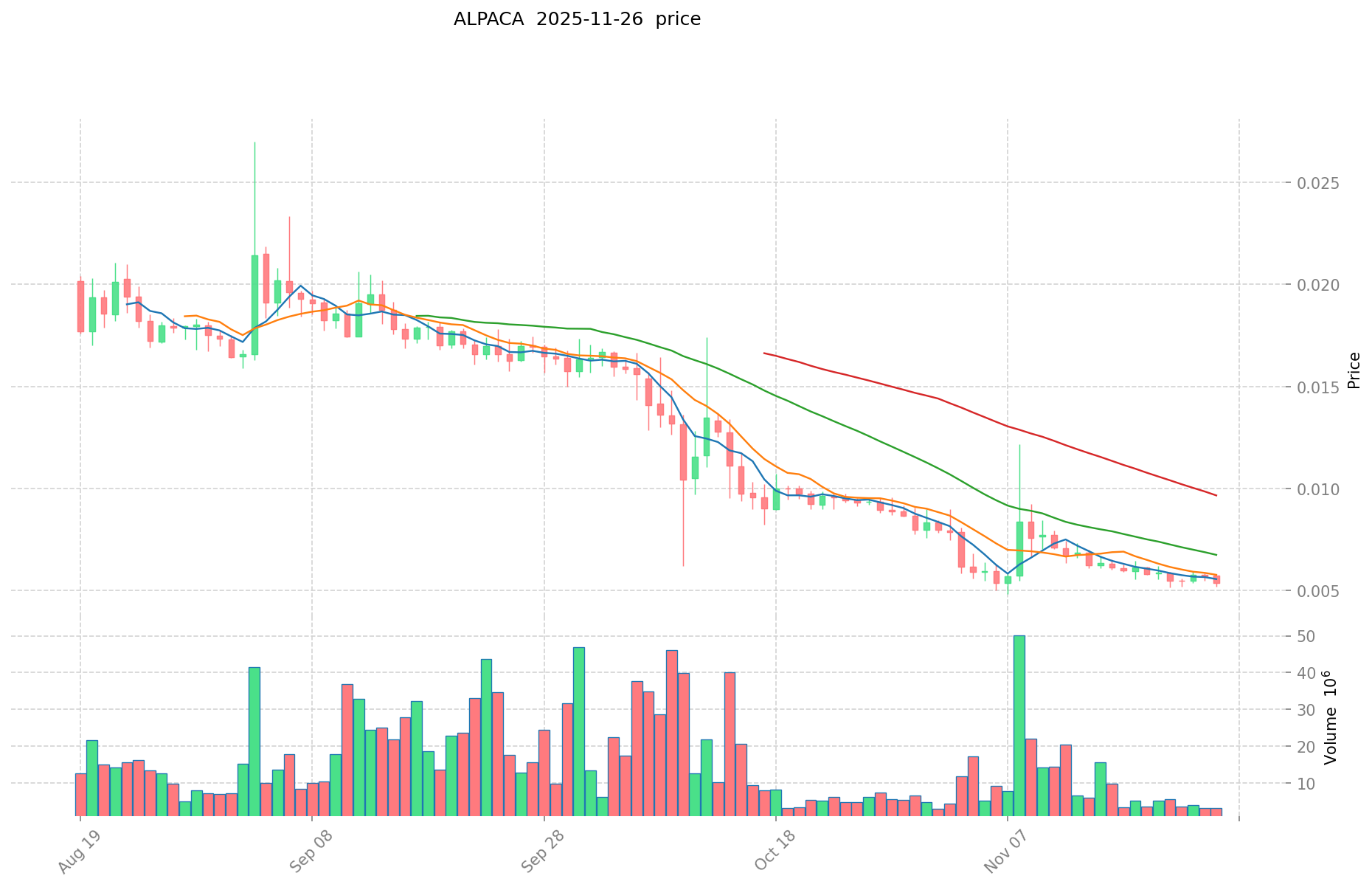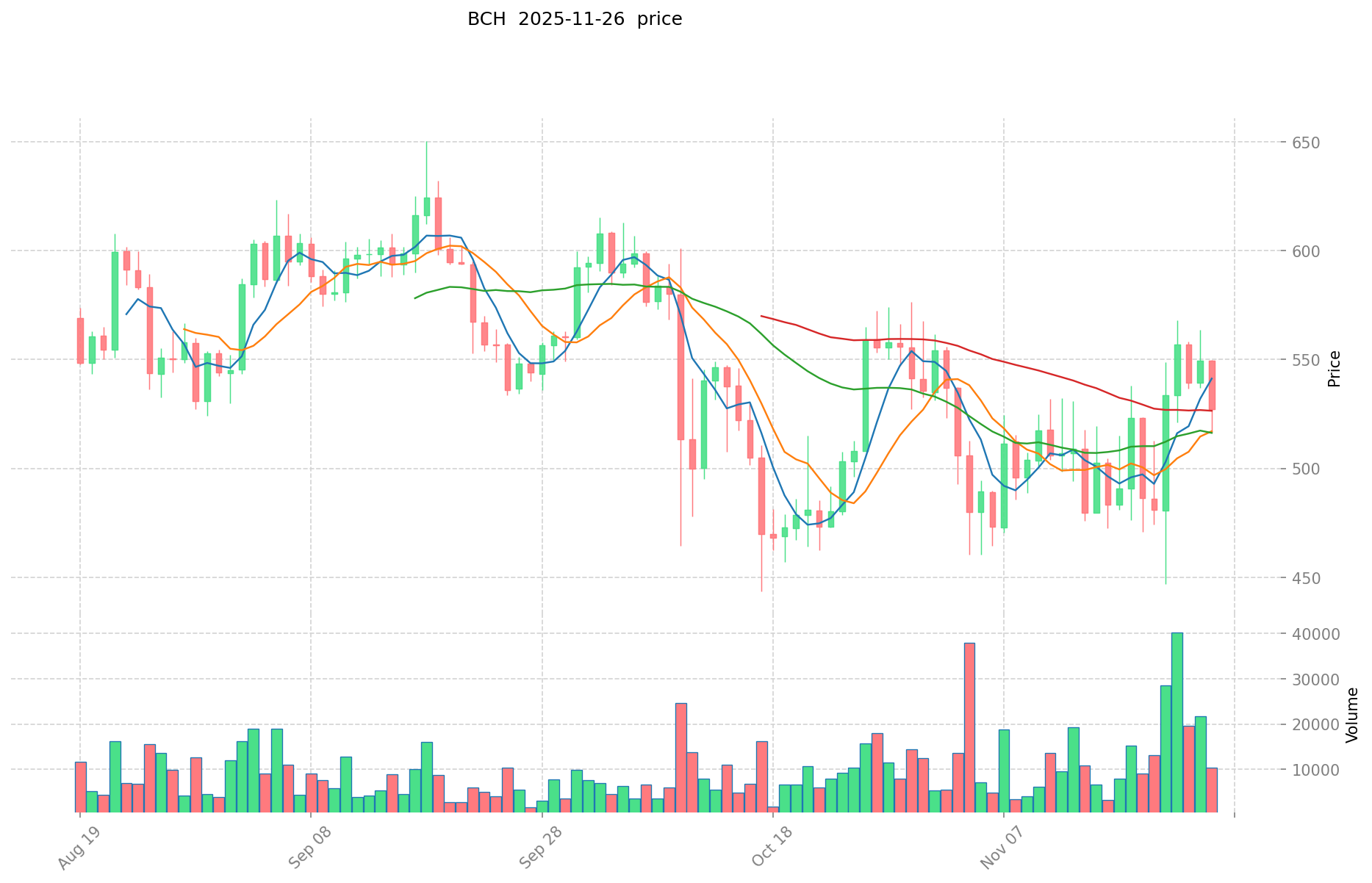ALPACA vs BCH: Comparing Two Innovative Approaches to Cryptocurrency
Introduction: Investment Comparison of ALPACA vs BCH
In the cryptocurrency market, the comparison between ALPACA vs BCH has always been a topic that investors cannot avoid. The two not only have significant differences in market cap ranking, application scenarios, and price performance, but also represent different positions in the crypto asset landscape.
Alpaca Finance (ALPACA): Launched in 2021, it has gained market recognition for its position as a leveraged yield farming protocol on the Binance Smart Chain.
Bitcoin Cash (BCH): Since its inception in 2017, it has been hailed as a peer-to-peer electronic cash system, and is one of the cryptocurrencies with the highest global trading volume and market capitalization.
This article will comprehensively analyze the investment value comparison between ALPACA vs BCH, focusing on historical price trends, supply mechanisms, institutional adoption, technological ecosystems, and future predictions, and attempt to answer the question that investors care about most:
"Which is the better buy right now?" I. Price History Comparison and Current Market Status
ALPACA and BCH Historical Price Trends
- 2021: ALPACA reached its all-time high of $8.78 shortly after launch, driven by initial excitement.
- 2017: BCH was created via a Bitcoin hard fork, with its price peaking at $3,785.82 in December.
- Comparative analysis: During the 2022 bear market, ALPACA dropped from its peak to a low of $0.00504079, while BCH declined but showed more resilience, maintaining a higher market cap.
Current Market Situation (2025-11-26)
- ALPACA current price: $0.005407
- BCH current price: $528.14
- 24-hour trading volume: $19,019.83 (ALPACA) vs $4,938,410.68 (BCH)
- Market Sentiment Index (Fear & Greed Index): 20 (Extreme Fear)
Click to view real-time prices:
- View ALPACA current price Market Price
- View BCH current price Market Price


II. Core Factors Affecting the Investment Value of ALPACA vs BCH
Supply Mechanism Comparison (Tokenomics)
- ALPACA: Leveraged yield farming strategy attracting investors with high yield rates
- BCH: Built on Bitcoin's technology with faster transaction speeds and lower fees
- 📌 Historical pattern: Supply mechanisms have driven interest particularly during bear markets where ALPACA continues to provide value to investors.
Institutional Adoption and Market Applications
- Institutional holdings: ALPACA stands as one of the highest TVL projects on BNB Chain
- Enterprise adoption: ALPACA offers leveraged yield farming strategies while BCH provides privacy-focused transaction protocols
- Regulatory attitudes: BCH benefits from broader wallet compatibility and cross-border value transfer capabilities
Technical Development and Ecosystem Building
- ALPACA technical advantages: Leveraged mining strategies that remain attractive even during bear markets
- BCH technical development: Focus on user-controlled fund management and borderless value flows
- Ecosystem comparison: ALPACA has positioned itself as a leading DeFi protocol on BNB Chain with strong yield strategies
Macroeconomic Environment and Market Cycles
- Performance in inflationary environments: Both tokens are positioned within the broader crypto ecosystem as alternatives to traditional finance
- Macroeconomic monetary policy: Crypto assets including ALPACA and BCH typically experience more rapid price fluctuations compared to traditional financial markets
- Geopolitical factors: BCH offers borderless value transfer as a core feature, making it valuable for cross-border transactions
III. 2025-2030 Price Prediction: ALPACA vs BCH
Short-term Prediction (2025)
- ALPACA: Conservative $0.00498088 - $0.005414 | Optimistic $0.005414 - $0.0073089
- BCH: Conservative $349.2126 - $529.11 | Optimistic $529.11 - $582.021
Mid-term Prediction (2027)
- ALPACA may enter a growth phase, with an estimated price range of $0.005307357735 - $0.007010954045
- BCH may enter a consolidation phase, with an estimated price range of $491.5643544 - $665.7896952
- Key drivers: Institutional capital inflow, ETF, ecosystem development
Long-term Prediction (2030)
- ALPACA: Base scenario $0.007778183385868 - $0.008944910893749 | Optimistic scenario $0.008944910893749
- BCH: Base scenario $858.09705966243 - $918.1638538388001 | Optimistic scenario $918.1638538388001
Disclaimer
ALPACA:
| 年份 | 预测最高价 | 预测平均价格 | 预测最低价 | 涨跌幅 |
|---|---|---|---|---|
| 2025 | 0.0073089 | 0.005414 | 0.00498088 | 0 |
| 2026 | 0.006743137 | 0.00636145 | 0.0033715685 | 17 |
| 2027 | 0.007010954045 | 0.0065522935 | 0.005307357735 | 21 |
| 2028 | 0.006985072485675 | 0.0067816237725 | 0.006035645157525 | 25 |
| 2029 | 0.00867301864265 | 0.006883348129087 | 0.006470347241342 | 27 |
| 2030 | 0.008944910893749 | 0.007778183385868 | 0.005366946536249 | 43 |
BCH:
| 年份 | 预测最高价 | 预测平均价格 | 预测最低价 | 涨跌幅 |
|---|---|---|---|---|
| 2025 | 582.021 | 529.11 | 349.2126 | 0 |
| 2026 | 688.90122 | 555.5655 | 311.11668 | 5 |
| 2027 | 665.7896952 | 622.23336 | 491.5643544 | 17 |
| 2028 | 895.176023364 | 644.0115276 | 495.888876252 | 21 |
| 2029 | 946.60034384286 | 769.593775482 | 484.84407855366 | 45 |
| 2030 | 918.1638538388001 | 858.09705966243 | 780.8683242928113 | 62 |
IV. Investment Strategy Comparison: ALPACA vs BCH
Long-term vs Short-term Investment Strategies
- ALPACA: Suitable for investors focused on DeFi yield farming and BNB Chain ecosystem potential
- BCH: Suitable for investors seeking established networks with broader adoption and payment use cases
Risk Management and Asset Allocation
- Conservative investors: ALPACA: 10% vs BCH: 90%
- Aggressive investors: ALPACA: 30% vs BCH: 70%
- Hedging tools: Stablecoin allocation, options, cross-currency portfolios
V. Potential Risk Comparison
Market Risk
- ALPACA: Higher volatility due to smaller market cap and DeFi-specific risks
- BCH: Susceptible to broader crypto market trends and Bitcoin-related news
Technical Risk
- ALPACA: Smart contract vulnerabilities, scalability issues on BNB Chain
- BCH: Network upgrades, potential chain splits
Regulatory Risk
- Global regulatory policies may impact both, with BCH potentially facing more scrutiny as a payment-focused cryptocurrency
VI. Conclusion: Which Is the Better Buy?
📌 Investment Value Summary:
- ALPACA advantages: High yield potential in DeFi, strong position on BNB Chain
- BCH advantages: Established network, wider adoption, faster and cheaper transactions than Bitcoin
✅ Investment Advice:
- New investors: Consider a smaller allocation to ALPACA for exposure to DeFi yields, larger allocation to BCH for more established crypto asset
- Experienced investors: Balanced approach, leveraging ALPACA's yield farming potential while maintaining BCH for stability
- Institutional investors: Focus on BCH for its liquidity and established market presence, consider ALPACA for diversified DeFi exposure
⚠️ Risk Warning: The cryptocurrency market is highly volatile. This article does not constitute investment advice. None
VII. FAQ
Q1: What are the main differences between ALPACA and BCH? A: ALPACA is a leveraged yield farming protocol on Binance Smart Chain, while BCH is a peer-to-peer electronic cash system forked from Bitcoin. ALPACA focuses on DeFi and yield strategies, while BCH aims to be a faster and cheaper alternative to Bitcoin for transactions.
Q2: Which has performed better historically, ALPACA or BCH? A: BCH has shown more resilience in terms of market cap and price stability. While ALPACA reached its all-time high shortly after launch in 2021, it experienced a significant drop during the 2022 bear market. BCH, despite declines, has maintained a higher market cap and more stable price over time.
Q3: What are the key factors affecting the investment value of ALPACA and BCH? A: Key factors include supply mechanisms, institutional adoption, technical development, ecosystem building, and macroeconomic conditions. ALPACA's value is driven by its yield farming strategies, while BCH benefits from its established network and broader adoption for payments.
Q4: How do the price predictions for ALPACA and BCH compare for 2030? A: For 2030, ALPACA's base scenario price range is predicted to be $0.007778183385868 - $0.008944910893749, while BCH's base scenario range is $858.09705966243 - $918.1638538388001. BCH is expected to have a higher potential upside in the long term.
Q5: What are the main risks associated with investing in ALPACA and BCH? A: ALPACA faces higher volatility due to its smaller market cap and DeFi-specific risks, including smart contract vulnerabilities. BCH is more susceptible to broader crypto market trends and potential regulatory scrutiny as a payment-focused cryptocurrency. Both face technical risks related to network upgrades and scalability.
Q6: How should investors allocate their portfolio between ALPACA and BCH? A: Conservative investors might consider allocating 10% to ALPACA and 90% to BCH, while more aggressive investors could opt for 30% ALPACA and 70% BCH. The exact allocation depends on individual risk tolerance and investment goals.
Q7: Which is better for new investors, ALPACA or BCH? A: For new investors, BCH may be more suitable due to its established network and wider adoption. However, a small allocation to ALPACA could provide exposure to DeFi yields. It's recommended to start with a larger allocation to BCH for stability and a smaller portion in ALPACA for potential higher yields.
Share
Content